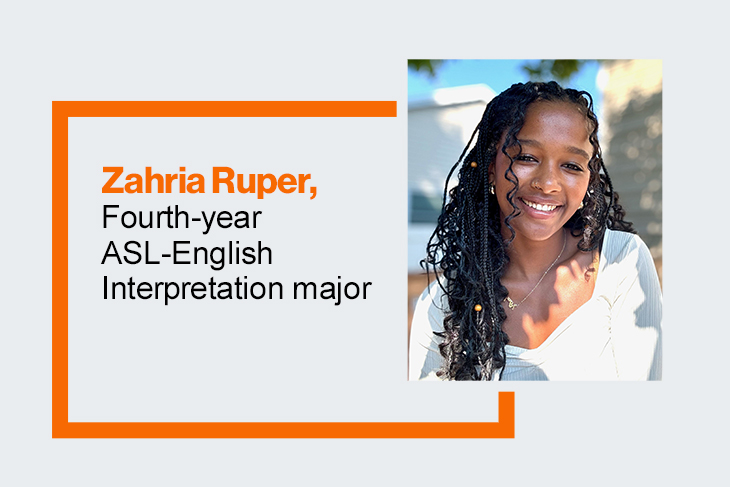ASL-English Interpretation major uses life experiences to build sign-language skills
Zahria Ruper connected with her Deaf brother after years of being unable to communicate
Growing up in Ethiopia, Zahria Ruper couldn’t communicate with her Deaf brother. But, life-changing experiences, including being adopted in the United States and learning American Sign Language from her adoptive mother, helped define her future. Today, Ruper, a fourth-year ASL-English Interpretation major at the National Technical Institute for the Deaf, is looking ahead to graduating in May and starting her career.
What were the circumstances around your interest in learning American Sign Language?
No one in my birth family knew sign language and, as a result, it put a barrier between us and my Deaf older brother. We did not have the resources to learn sign language and we were limited to communicating with him through gesturing and home signs.
When we arrived in the United States after living in an Ethiopian orphanage, our adoptive mom, a certified interpreter and an NTID graduate, taught us American Sign Language. This was the first time I was able to have a conversation with my brother. I fell in love with the language and culture. I loved how it was visual, and it made it much easier for me to learn English. Since then, my parents have adopted seven more kids, with a majority of them being Deaf.
What made you decide to become an interpreting major?
My mother would always interpret for my siblings. I would watch and be so mesmerized by it. I also interpreted conversations between my extended family and siblings. I never wanted my siblings to be left out in conversations or miss a chance to build relationships with others. Our family worked hard together to ensure that communication access was always available. This inspired me to pursue an interpreting degree.
What are your favorite events and activities to interpret? And what do you find the most challenging?
I enjoy interpreting panel discussions and speeches. It is a challenge especially if there are multiple speakers. But I love that I am able to include multiple individuals. I also love interpreting musical performances. There is so much room for creativity and unique opportunities to play with the language and connect it with rhythm.
I think one of the most difficult things to learn and master as an interpreter is the ability to hold information while simultaneously interpreting and receiving more information. It requires a lot of mental processing and accurately determining lag time.
What extracurricular or volunteer activities help you sharpen your interpreting skills?
Once a month, I volunteer at my church to interpret worship music. I love that I am able to serve the Deaf community in this way. It is something that I look forward to and that I’m passionate about. I have also volunteered for several seminars as well as different events and classes within the community. I love giving back, making connections, gaining experience, and helping to make communication accessible.
Last summer, I had an opportunity to volunteer and interpret at a music festival. I worked alongside many professional interpreters, one of whom was my mom. It was an amazing experience. I was able to serve and interact with many diverse Deaf individuals. I also had the opportunity to volunteer and interpret for a martial arts class. There were some challenges, but it helped me to learn how to collaborate with the individuals involved to provide full access.




